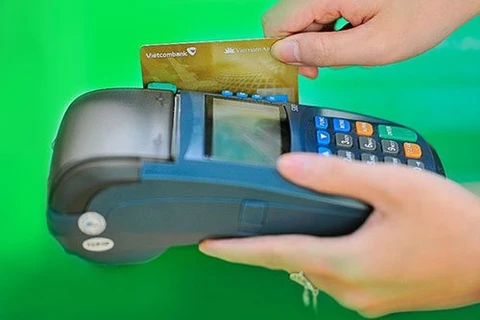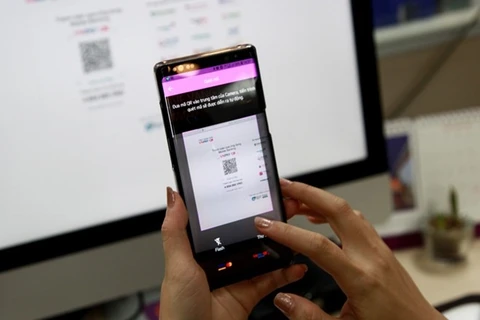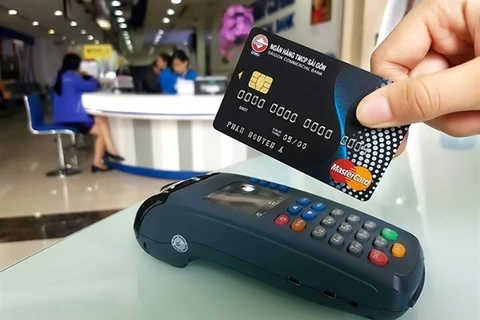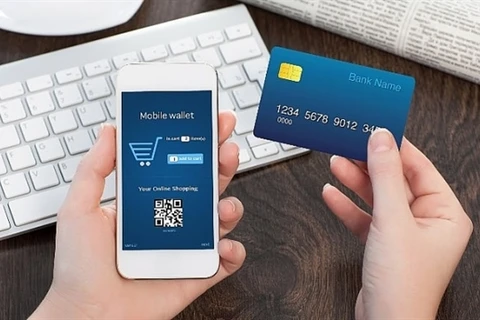Hanoi (VNA) – About 35 million people use smart phones in Vietnam, which is a favourable condition for the development of banking services on mobile platform.
Thanks to smart banking services, bookings for accommodation and airfares, or payments for electricity and water bills, insurance premiums, and tuition fees can be made at home with just a few taps of a mobile phone.
Along with these conveniences, smart banking plays an important role in shaping a non-cash community in Vietnam, an irreversible trend in the era of the fourth industrial revolution (Industry 4.0).
Duong Thao, a resident in Xuan Dinh ward, Tu Liem district, said the smart banking app developed by Joint Stock Commercial Bank for Investment and Development (BIDV) has helped her shop online and pay water and power bills.
Vu Huy Hoang, an online business owner in An Khanh urban area, also expressed his satisfaction with smart banking applications.
“Earlier, I spent a lot of time waiting at the bank as transactions could not be made at home. However, with this smart app, it only takes me a few minutes to transfer money, pay bills, or top up my mobile phone account,” he said.
Well-developed banking services needed
Despite the huge advantages of non-cash payment, its development has been slow in Vietnam as most of the population has not yet embraced its benefits.
About 40 percent of Vietnamese people have bank accounts, but 90 percent of the population still use cash daily. Up to 85 percent of ATM transactions are cash withdrawals.
Vietnamese consumers prefer cash as it is fast and universally accepted. Many also like managing a cash budget and spending money without paying additional costs.
For many, cash payments are more secure and private because they leave no digital trace and reveal no personal information.
Vietnam has some 48 million internet users, and around 35 million people with smartphones, 45 percent of whom use their phone for online shopping. This could signify favourable conditions for non-cash payments to develop. However, weak banking infrastructure has slowed progress.
The Government has a set target to cut cash payments to under 10 percent by 2020, requiring drastic efforts.
As for the banking sector, it should work to expand the network of card acceptance points to ensure people can make transactions in rural and remote areas, and ensure the security of all transactions.
Commercial banks adopt advanced technology to enhance security
Several banks are introducing smart technology to tighten security and make customer transactions safer.
They will apply enhanced authentication methods for online transactions from the beginning of this month to comply with the central bank’s regulations on improving security for customers.
This means standard text messaging will be replaced with a new system that can send passwords to devices even if the recipient has no coverage.
BIDV is to implement Smart OTP (one-time password) to authenticate online transactions for both individual and corporate clients from July 1.
The aim is to strengthen security for customers and comply with the State Bank of Vietnam’s regulations on security for e-payments and bank card payments, the bank said.
Smart OTP will be obligatory for all domestic and international money transfer transactions made by corporate clients through BIDV Business Online services.
For individual customers, every transaction of more than 100 million VND (4,292 USD) each or total value of 100 million VND per day through BIDV Online and BIDV Smart banking services will need to be authenticated by Smart OTP.
Vietcombank has also stopped using authentication through text messaging and started using passwords provided through its smart system for corporate clients' online transactions.
Vietnam Prosperity Bank made a similar move, requiring corporate customers to use OTP received through VPBank Smart OTP instead of passwords from mobile phones or emails.
A similar obligation has also been applied for money transfers with value of more than 100 million VND per day made by individual customers.
These new rules are to take effect on July 1.
In April this year, Techcombank also replaced SMS OTP and Token OTP with the Smart OTP system.
An advanced OTP software programme will be installed on a mobile phone or tablet registered with the bank and will generate the OTP together with a transaction code. It works even if the device has no signal.
The security level of smart OTP is ranked among the highest security solutions, satisfying security requirements of online and high-value financial transactions.
To enhance security, some commercial banks have also adopted biometric identification authentication.-VNA


























